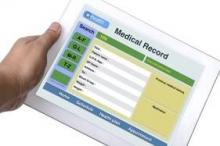Adoption of electronic health records reached 78% of office-based physicians in 2013, but use of two key functions that are expected to help improve health outcomes and lower the cost of health care – health information exchange and patient engagement functions – lag behind from an uptake perspective.
Primary care physicians are adopting faster than other specialty providers, with 53% of primary care physicians adopting at least a basic EHR by the end of 2013, compared with 43% of physicians in other specialties, according to a recent study published online Aug. 8 on the Health Affairs website (doi:10.1377/hlthaff.2014.0445).
The size of a practice is a determining factor, with two-thirds of physicians in large practices using a basic EHR, compared with 37% of solo practitioners, Michael Furukawa of the Department of Health and Human Services and his associates reported.
But while adoption is growing, information is not being shared at an equally high rate. Thirty-nine percent of office-based physicians reported having any electronic health information exchange with other ambulatory providers or hospitals in 2013, with physicians in larger practices having 36%-99% higher odds of any electronic health information exchange (HIE), compared with solo practitioners. Physicians in practices owned by academic medical centers or health maintenance organizations had 146%-185% higher odds of any HIE relative to physician-owned practices, and multispecialty practices had 110% higher odds of any HIE, compared with single-specialty practices.
"There are many reasons why physicians may not be sharing clinical data with other providers, especially with those outside their organization," the authors wrote. "There are privacy concerns and technical barriers because of incompatible systems. ... Additionally, HIE often requires the redesign of work flow, which is inherently disruptive and may be difficult to justify in the absence of a clear business case for HIE."
On the patient engagement side, about two-thirds of office-based physicians had the capability to electronically provide patients with visit summaries or patient-specific educational resources, and about half were able to exchange secure messages with patients. About 40% had the capability to allow patients to view, download, or transmit their information electronically, but only half of these physicians did so. Similarly, only a third of physicians with secure message capabilities used it on a regular basis.
The authors cited several factors, including the low uptake of patient portals and lack of awareness of capabilities, as well as poor usability. Also, "physicians may worry that patient portals might generate a large volume of clinical issues that require responses (time for which the physician cannot bill). And finally, some providers are concerned that accessing these data might make patients confused or worried," the authors wrote.
Stage 2 meaningful use criteria require the adoption of computerized capabilities for patient engagement.
The analysis was based on the 2009 National Ambulatory Medical Care Survey and the 2009-2013 Electronic Health Record Surveys, conducted by the National Center for Health Statistics. No conflicts of interest were disclosed by the authors.


